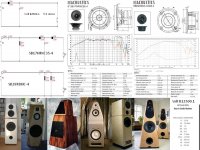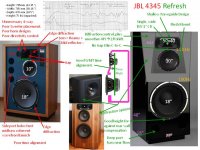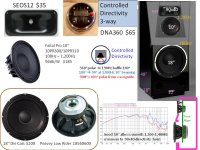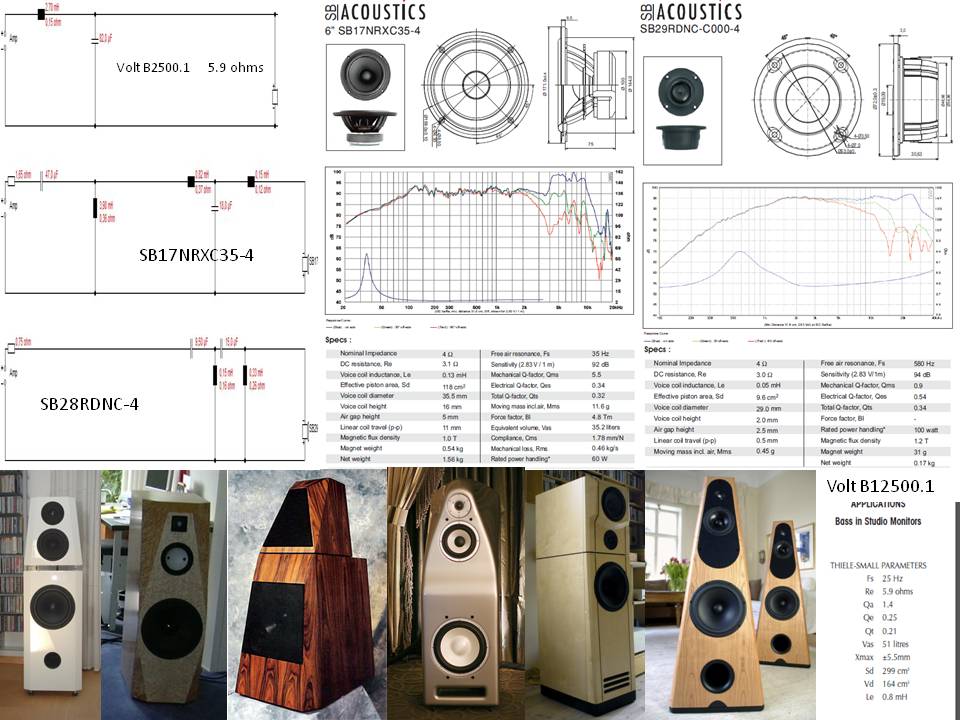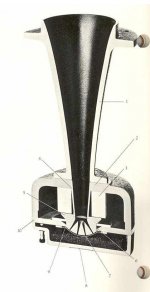Maybe im better off selling and forget DIY and get a pair of JBL 4312E
JBL Studio Monitor 4312 E - JBL
JBL Studio Monitor 4312 E - JBL
Aloha Robert xXx
You might also want to try the Altec Lansing Heritage forum:
Lansing Heritage Forums
A lot of deep knowledge specific to JBL there, whether purchasing or DIY.
Cheers!
You might also want to try the Altec Lansing Heritage forum:
Lansing Heritage Forums
A lot of deep knowledge specific to JBL there, whether purchasing or DIY.
Cheers!
Those 4312s strike me as odd.
Running the 12" woofer up to 2000Hz must play havoc with the power response and why then bother to make it a 3way and again creating power response issues at 5k?
Running the 12" woofer up to 2000Hz must play havoc with the power response and why then bother to make it a 3way and again creating power response issues at 5k?
The JBL 4343, 4344, 4345 Studio Monitors that you lust after continue to have a cult following because of their high efficiency and effortless dynamics. 95db/watt SPL requires LARGE, HIGH efficiency speakers, plus a compression driver tweeter attached to a waveguide. Members of the Altec Heritage forum have detailed theads describing duplicate construction using new JBL speakers and Xovers.
DIY JBL 4344 project
Ideas for using modern technology to construct superior sounding high efficiency large studio monitors are also common.
A speaker using the 90db/watt Volt B2500.1 as the single woofer is best combined with a 6" midrange and 1" dome tweeter in a diffraction controlled cabinet. A balanced design with ~ 88db/watt SPL after baffle step compensation.
SB Acoustics offers great speakers at modest prices. Using a ~6" midbass offers coherent vocals and good polar response up to ~2Hz for 1"dome marriage. There are several DIY 2-way ~1800Hz crossovers for the 6" SB17NRXC35-4 midrange and SB29RDNC-4 dome tweeter, plus 3-way DIY crossovers which add 8" to 12" woofers. Bass compensation is requred for baffle step and room effects. A clever cabinet shape can significantly reduce edge diffraction artifacts, and also smooth out the 4Pi - 2Pi baffle step. At low frequencies there is room bass gain(+SPL), countering baffle step(-SPL), and a using a robust 6" midbass allows some coverage of this gap.
The old school JBL monitor boxes suffer from edge diffraction, lip reflections, internal resonances, poor driver time alignment, lack of controlled directivity polar response, horn honk, ... If you build the box, don't complain about its faults.
DIY JBL 4344 project
Ideas for using modern technology to construct superior sounding high efficiency large studio monitors are also common.
A speaker using the 90db/watt Volt B2500.1 as the single woofer is best combined with a 6" midrange and 1" dome tweeter in a diffraction controlled cabinet. A balanced design with ~ 88db/watt SPL after baffle step compensation.
SB Acoustics offers great speakers at modest prices. Using a ~6" midbass offers coherent vocals and good polar response up to ~2Hz for 1"dome marriage. There are several DIY 2-way ~1800Hz crossovers for the 6" SB17NRXC35-4 midrange and SB29RDNC-4 dome tweeter, plus 3-way DIY crossovers which add 8" to 12" woofers. Bass compensation is requred for baffle step and room effects. A clever cabinet shape can significantly reduce edge diffraction artifacts, and also smooth out the 4Pi - 2Pi baffle step. At low frequencies there is room bass gain(+SPL), countering baffle step(-SPL), and a using a robust 6" midbass allows some coverage of this gap.
The old school JBL monitor boxes suffer from edge diffraction, lip reflections, internal resonances, poor driver time alignment, lack of controlled directivity polar response, horn honk, ... If you build the box, don't complain about its faults.
Attachments
The old school JBL monitor boxes suffer from edge diffraction, lip reflections, internal resonances, poor driver time alignment, lack of controlled directivity polar response, horn honk, ... If you build the box, don't complain about its faults.
Hello Linesource
Have you ever owned a pair?? The statement about horn honk is hogwash. The rest is correctable except for the time alignment. The directivity on the 4 ways like the 4344 is better than you think.
With all their warts they are still killer systems for the money. All those issues you stated don't seem to make a difference once you turn them on.
Rob🙂
LineSource,
The JBL 4345 Refresh looks like a fabulous design!
Hats off to the designer(s).
I wish I had the room that it would work in.
As for the improvements, they may or may not be audible, but if your doing an update, why not incorporate the latest refinements?
thanks for the reference.
Doug
The JBL 4345 Refresh looks like a fabulous design!
Hats off to the designer(s).
I wish I had the room that it would work in.
As for the improvements, they may or may not be audible, but if your doing an update, why not incorporate the latest refinements?
thanks for the reference.
Doug
Hello Linesource
The statement about horn honk is hogwash.Rob🙂
Hi Robh3606,
You earlier observed that a long exponential horn with a small abrupt circular exit like the JBL 2307 used in the JBL 4345 monitor is prone to horn honk. (yes, yes, "horn honk" is broadly over used to explain several horn design faults)
Robh3606
"Even more significant is some of the worst honkers out there, like some of the older exponentials a JBL 2307 is a fine example can honk terribly depending on level and crossover points. All of these older honkers don't even have difraction slots as they are used in the more modern CD type horns."
http://www.diyaudio.com/forums/multi-way/161627-horn-honk-wanted-59.html#post2152308
I would not bet my family fortunes on speakers which mate a JBL2307 exponential horn to a 10" midbass. There is a stereo shoppe in Santa Cruz California I have visited which has JBL Paragons and JBL 4345 Studio Monitors in their vintage audio room. Effortless Dynamics is the JBL 4345 best virture.
Attachments
Hello Linesource
I am well aware of what I have written. First off the 2307 is the shorter version not the long one used in the 4333/L300. They do not honk in the 4344/4345 because they are crossed over at 1.3K. JBL did use the same horn crossed over at 500Hz in some of the older 60's systems. This could be a problem. Like everything else it is application specific.
Rob🙂
I am well aware of what I have written. First off the 2307 is the shorter version not the long one used in the 4333/L300. They do not honk in the 4344/4345 because they are crossed over at 1.3K. JBL did use the same horn crossed over at 500Hz in some of the older 60's systems. This could be a problem. Like everything else it is application specific.
Rob🙂
Last edited:
Another silly moniker to subjectively describe sound Huh?
Define "Honk" in technical, objective & measurable terms please.
Can't measure it? Then I submit it doesn't exist...except perhaps only in the listeners mind.
________________________________________________Rick............
Define "Honk" in technical, objective & measurable terms please.
Can't measure it? Then I submit it doesn't exist...except perhaps only in the listeners mind.
________________________________________________Rick............
Another silly moniker to subjectively describe sound Huh?
Good point considering how they measure.
Rob🙂
I agree that suggestions in posts 43&49 are the most suitable for the Volt woofers, (similar to my current system, 2.5 way with 10" Peerless woofers & Seas ER18RNX based 2 way on top), but it won't be anything like a JBL - that would require a big (15")woofer & efficient drivers in a too-small box...
- Status
- Not open for further replies.
- Home
- Loudspeakers
- Multi-Way
- I need help and lots of it. JBL dream.
